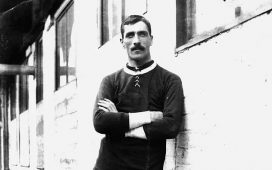On the road with Manchester United: a journey in 19 acts. As with most road stories, the biggest question around United’s record unbeaten away run is whether, for all the fun, the jazz, the poetry, the roman candle pyrotechnics, it’s actually leading them anywhere.
This is a bildungsroman that will head back to its start point once again on Sunday afternoon. It is almost exactly a year since United set off on their magic bus tour with a 2-0 victory at Stamford Bridge. Those 19 Premier League away matches without defeat have cut across two seasons, the mixed and varied delights of pre- and post-Covid football, plus one disorientating midsummer overspill. From here United face two immediate tests: Chelsea and then Manchester City’s title-bound cavalry charge at the Etihad a week later.
Get through those two with the chassis intact and Ole Gunnar Solskjær’s team will find themselves four winnable games from an entire Premier League season unbeaten away from home – a run that will, on current standings, still get them nowhere near actually winning the thing.
It is in keeping with the uncanny nature of the football year that it is still hard to get a proper look at this achievement, to interpret it in any sensible way. Is this a sign of something tangible, progress made towards an end point? Or just an oddity of the plague football times?
Home advantage has always been a puzzling thing, based in emotion, ritual, mythology, noise. There is no dispassionate reason why one square of grass, one bus journey, one group of shouting humans should have such a profound effect on a choreographed athletic performance. And yet the history of all football ever played confirms that this is very much the case, an affirmation of the role of emotion, of how a footballer feels in the way the games play out.
Home and away form was always likely to converge when players are essentially performing in front of plastic and cobwebs. Only Chelsea of the top nine Premier League clubs have lost more away games than they have at home.
With United, however, this is something else, a straight flip between the two. The away record (W14 D5) is the stuff of an imperious, title-winning romp. At Old Trafford over the same period United are Europa League also-rans. The last time they lost this many home games (four) was 2013-14, the Moyes Interlude, when Old Trafford was a place of sorrows and mischievous energies.
Look closely and there is no great mystery here. This isn’t about mentality, or being spooked by the empty stands. United are a different team away from home because they are literally a different team.
Even though the stadium is empty, Solskjær has continued to pick different XIs and different formations for home and away. One near-constant in the away team is his use of that gristly two-man defensive midfield pivot. Scott McTominay has played in 16 of those 19 away games. Fred has started 12 of them, and been missing for all but one of the home defeats.
On the other hand Solskjær has tended to play a more attacking hand at home, often starting with five overtly attacking players on the pitch. Paul Pogba has started every home league game in which United have dropped points this season, bar the 0-0 with Chelsea where he came on for the last 32 minutes.
Study these variations and the mystery of United’s inverted form is no mystery at all. Solskjær isn’t just picking a more defensive team away from home. He’s picking a more effective one. That pared back, double-pivot “away” formation is United’s best self right now. Only Stuttgart have scored more counterattacking goals in the whole of Europe this season. This is a function of the same forces. The midfield pivot gives the platform to be comfortable without the ball, to allow an opponent to be drawn forward.

Then, as ever, there’s Bruno Fernandes. The start point for all this, that win against Chelsea at Stamford Bridge in February 2020, was also Fernandes’s first Premier League away game. Looking for a register of one man’s creative influence? United’s 19-match run has spanned Fernandes’s entire United career to date. Thirteen of his 23 league goals have come away from home.
The away team, the away shape: it all just seems to fit a little better. The best of this team has been Fernandes lurking in those half-spaces, with licence to take risks, to look for a point of incision every time, with Marcus Rashford (this season: home goals three, away goals six) haring off into space ahead of him.
It is, of course, a self-fuelling process. Fernandes has spoken about “the belief” United feel away from home. That road-trip spirit feels like something robust and galvanising at a time when football can seem vague and half-formed. Before the 2-1 win at Fulham in January – game 17 – it was striking how fiercely bonded the players looked at kick-off. There are always hugs and backslaps. These were hugs and backslaps with feeling.
United won at Craven Cottage with another late goal, another three points gained from a losing position. This has been the pattern recently, with four draws and three victories by a single goal in their last seven away games. It is a run that will be tested to the full on Sunday by opponents in a powerful swell of form.
This is the other point of fascination, a meeting of second and fifth, that also pitches Solskjær against Thomas Tuchel, the man who oversaw United’s ejection from the Champions League in December. That night at Old Trafford it was Tuchel’s redeployment of his Paris Saint-Germain frontline after half-time that tipped the game. Tuchel also loves a double pivot. He loves a tactical puzzle.
United aren’t just a good away team: they are a good team when they play a certain way. Extending that run to 20 on Sunday afternoon would confirm that this road story really does have some substance to it.








